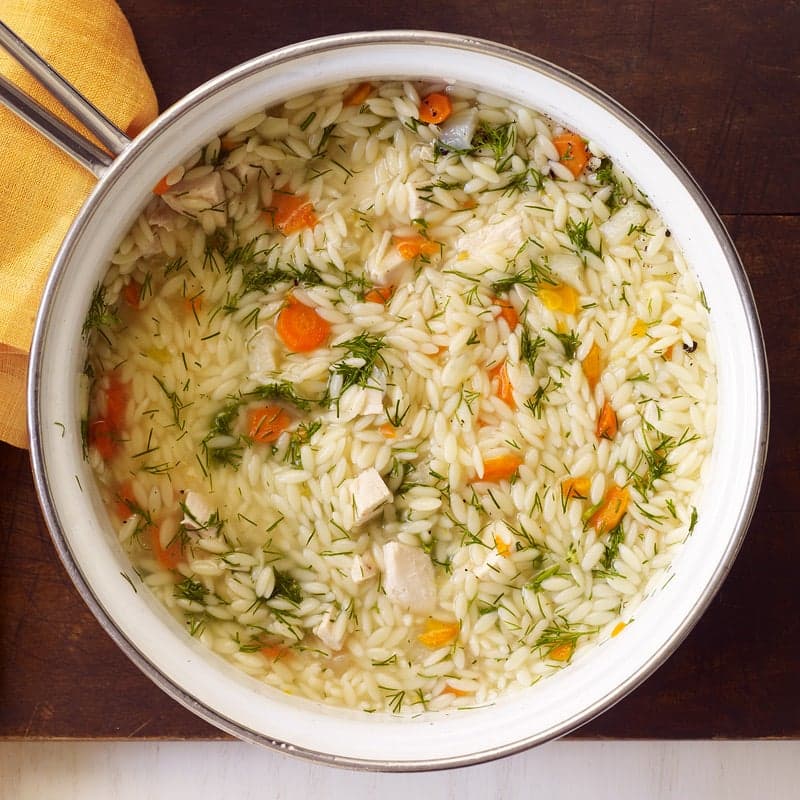5 foods to help support a healthy immune system
Immune-boosting foods include the oranges and chicken soup you expect — and oysters, beans, yogurt, and more that you may not.

Not to freak you out, but there are more than 200 different respiratory viruses, and that’s not even counting the stomach bugs and bacterial infections. Adults get an average of two to three colds per year, and kids even more than that; most people are hit between September and May.
If you’ve long believed that your Grandma’s soup — whether that’s chicken noodle, pozole, Italian wedding, or pho — is a cure-all for any of those 200+ illnesses, you may not be far off: Certain foods do play a role in a healthy immune system. The best defenses against catching a virus are: avoiding close contact with people who have a cold, washing your hands often, making sure people around you and yourself are covering coughs and sneezes, and keeping your fingers away from your nose and eyes to avoid infecting yourself. Beyond that, components in certain foods may also help you fend off or cope with a cold, the flu, or another virus. Read on to find out what science has to say about supporting a healthy immune system with what you eat.
1. Chicken soup
Tend to reach for a bowl of chicken soup whenever you feel run down? It’s no wonder: Chicken soup may provide a mild anti-inflammatory effect that appears to lessen the severity of cold symptoms. Researchers credit ingredients like veggies, which are rich in vitamins, minerals, and antioxidants, for helping to reduce inflammation. Although the jury is out on the ideal soup recipe and exactly how much soup to consume, researchers believe that simply sipping the warm liquid can help improve upper respiratory tract symptoms. Bonus: It serves up a dose of fluids and satisfying protein to both help you meet your nutrient needs and stay on track when you’re under the weather, says Jackie London, R.D., CDN.
Chicken soup recipes
Plagued by the sniffles? Try one of these veggie-packed, soothing chicken soup recipes:
Recipes
2. Citrus fruits
Oranges, grapefruits, lemons, and limes are a great source of vitamin C, a potent antioxidant that plays a role in immune cell functioning (i.e., helps keep your immune system in good shape). So it makes sense that the converse is true: Research shows that vitamin C deficiency is associated with impaired immunity and higher susceptibility to infections.
That said, putting a single orange in your lunch when your coworkers come down with a cold won’t do much to prevent you from getting sick or shorten the length of a cold if you catch it. Developing a habit of eating a range of foods that contain vitamin C, as well as a variety of antioxidants — like in citrus fruits — can better support overall health. Another caveat: Eating an orange beats drinking a glass of orange juice, since fruit is higher than juice in fiber, antioxidants, phytonutrients, and prebiotics, all of which support health, London says. (It’s why an orange is a ZeroPoint™ food, while O.J. uses Points.)
Citrus recipes
Incorporate a range of citrus fruits into your meals with these zesty recipes:
Recipes
3. Yogurt and other probiotics
The gastrointestinal tract contains approximately 70-80% of the all out immune cells, says board-certified gastroenterologist Brittany Seminara, M.D., who practices at Atrium Health in Charlotte, North Carolina.
Generally, the gut’s naturally-occurring bacteria aid in digestion and keep the lining of your gut healthy. However, medications, infections, illness, and other environmental factors (like what you eat) can disturb the balance of gut bacteria — one reason why it may be smart to consume beneficial bacteria known as probiotics, which occur naturally in foods like yogurt, kefir, kimchi, miso, and sauerkraut.
While a common myth suggests that dairy increases mucus production and can do more harm than good when you’re already feeling under the weather, rest easy: Research suggests this isn’t true, so don’t let that stand in the way of probiotic-packed dairy.
Probiotic-packed recipes
Get more beneficial probiotics with these dishes:
Recipes
4. Beans and other prebiotic fiber
Fiber, or carbohydrates that pass through the digestive tract to promote healthy digestion and elimination, is an essential part of a nutritious diet. Eating prebiotic fiber, a type that helps to feed the healthy bacteria found in your gut, may play a role in supporting immune system functioning. Foods with prebiotic fiber include beans, onions, leeks, garlic, whole grains (including oats), cashews, soy, and fruits such as bananas.
Fiber-rich recipes
Enjoy gut-friendly prebiotic fiber with these recipes:
Recipes
5. Shellfish and high-zinc foods
Zinc is a nutrient that’s essential for proper immune system functioning. It’s found in a whole bunch of tasty foods including oysters (the best source of zinc per serving), mussels and other shellfish, yogurt, milk, poultry, red meat, beans, nuts, and whole grains. And while most people get enough zinc through their diet, when you’re trying to outrun a virus, supplementing with zinc from the onset of a cold could help you feel better faster.
Zinc-rich recipes
Amp up your zinc intake with these meals:
Recipes
The bottom line
The best thing you can do to ward off colds is to make sure to wash your hands well and often and to keep them away from your face; avoid people who are sick; and disinfect places or objects touched by many people (like door handles, phones, and keyboards) before using them. To help your body maintain a healthy immune system, it’s not just about chugging O.J. or a green juice when someone around you is sick; you want to eat plenty of whole grains, fresh fruits and vegetables, lean meats, fish, eggs, and dairy year-round — and particularly during cold and flu season, Seminara says.







































